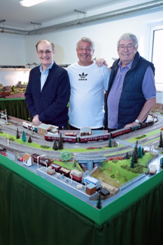Sidelines - creating space for men in extra care
I support residents at The ExtraCare Charitable Trust’s villages and retirement schemes to maintain their well-being and mental health. I have observed the importance of providing activities for men, who are often outnumbered by women in retirement communities and are potentially at risk of isolation…..
 The UK is experiencing an epidemic of loneliness, with statistics showing that the issue affects people across all demographics. Men are particularly at risk. In fact, a recent survey by the Royal Voluntary Service found that more than 1 in 4 men aged 65-69 (opens new window) said that they felt lonely after retiring.
The UK is experiencing an epidemic of loneliness, with statistics showing that the issue affects people across all demographics. Men are particularly at risk. In fact, a recent survey by the Royal Voluntary Service found that more than 1 in 4 men aged 65-69 (opens new window) said that they felt lonely after retiring.
Picture Caption: Shenley Wood Village enthusiasts show off their model railway.
Typically, retirement communities have a larger population of female to male residents, and the same can be said of ExtraCare’s villages and schemes, where 66% of our residents are female. It shouldn’t be surprising then that many activities within villages are geared towards women. Activities are an important part of forming communities that combat loneliness and isolation. The opportunity to spend time with people and bond over shared interests is vital in helping older people remain independent.
However, a common image of retirement housing is ‘knit and natter’, which of course men can join, but are less likely to. So how are retirement villages reaching out to men with their facilities and activity groups?
At ExtraCare we’re providing activities and facilities that encourage male friendship and the interchange of skills and ideas that allow conversations to flow. Getting men together to address a topic such as loneliness can be challenging, whereas having something to do creates purpose, occupation and social engagement.
We start the process at design level, incorporating facilities such as woodwork, hobby rooms and greenhouses into the architecture of our villages. These spaces welcome everyone but experience shows they do attract men, catering for their interests even without the sheds, garages or gardens left behind in their old home. We also encourage volunteering, enabling residents to contribute to community life; volunteering plays an important role in maintaining self-esteem.
Mick Parker, 76, from our Lark Hill Village in Nottingham, moved there because we provided a woodwork room. He is a retired joiner who set up a woodwork group that takes commissions and is completely self-funded by resident volunteers. He says:
“I don’t know what I’d do without the woodwork room. It was my biggest reason for moving to the village as I knew it would give me something to do. I’d vegetate if I didn’t have it…. There was a while when I was off for two or three weeks and when I got back I struggled to remember what to do and that frightened me. So being able to use the room means a lot, it stops your brain going soft, especially after retirement when you’ve got little to do.”
Tom Bough, who lives at our Longbridge Village in Birmingham, has been working on a model railway in the village’s woodwork room since he moved in. He is an ex-shop steward who was made redundant and then started his own business as a car mechanic.
Tom says:
“It took me nine months to learn how to retire because it’s so different from working life. I’ve now been retired for two and a half years. The model railway helped to keep me occupied. You’d stagnate if you didn’t have something to do.
When I moved to Longbridge, using the woodwork room and building the railway was a great way break in and make “man-friends”. It’s a social activity, we talk about all sorts and swap tips and hints. Having the room and the chance to build the railway is important because we can all just chat and get to know each other. It’s more like a social room than a hobby room.”
Model railways have also been created by enthusiasts at our Shenley Wood and New Oscott Villages.
We currently provide up to 50 activities a week at each of our locations and within the mix we are ensuring men are fully included. Our approach is proven to tackle issues such as loneliness and isolation, as well as mental health conditions like depression. And our research with Aston University (opens new window) shows that the charity’s integrated model that links a sociable and active lifestyle to people’s health and housing needs can reduce the incidence of clinical depression by up to 64%.
Whilst we ensure opportunities are available for men it would be a mistake to believe we are trying to segregate activities, or the sexes, along traditional lines. Far from it, at ExtraCare we have men who knit and women who sky dive. We are also developing an LGBT strategy to ensure we are providing inclusive opportunities for all our residents.
We simply want to provide a platform to enable all our residents to feel included, confident and part of the community where they live allowing them to form friendships where they share skills as well as conversation.
Bill Hodder, 80, who lives at Lark Hill and also uses the woodwork room sums up his view:
“I’m not the kind of person to just sit in front of the TV. The woodworking group has been absolutely wonderful – it’s an activity available for me!”
Find out more about the Charity’s work here: www.extracare.org.uk (opens new window)

Comments
Add your comment